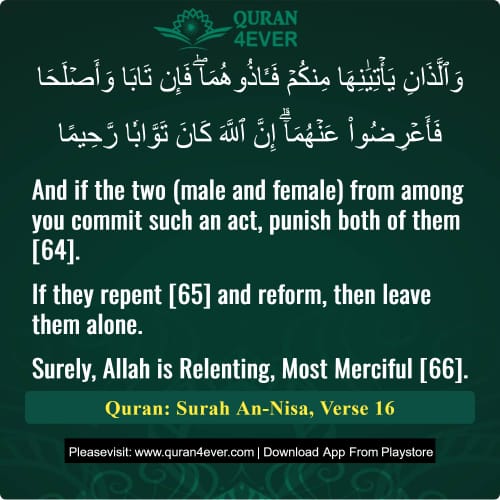
Transliteration:( Wallazaani ya'tiyaanihaa minkum fa aazoohumaa fa in taabaa wa aslahaa fa a'ridoo 'anhumaaa; innal laaha kaana Tawwaabar Raheema )
"And if the two (male and female) from among you commit such an act, punish both of them [64]. If they repent [65] and reform, then leave them alone. Surely, Allah is Relenting, Most Merciful [66]."
The word “punish” here includes:
Verbal rebuke (scolding, shaming),
And physical punishment (such as beating).
This verse is also abrogated in the case of adultery, similar to the previous verse. However, the distinction lies in:
Verse 15 used the phrase "your women", which refers to married women,
But here, the verse states "two from among you", meaning a bachelor and a spinster.
Hence, there's no repetition but a change in legal scope.
According to some Ulama, the earlier verse refers to lesbianism, while this verse refers to sodomy.
In that case, this verse is not abrogated, but remains firm.
This means there is no fixed legal punishment (Hadd) for these acts,
but a discretionary punishment (Ta’zir), to be determined by the judge.
As per Hazrat Imam Abu Hanifa (رضي الله عنه) (Khazainul Irfaan):
There is no specific punishment for sodomy and lesbianism,
So the judge may assign whatever punishment he deems appropriate.
This is supported by the fact that the Sahaba (Companions of the Prophet ﷺ) implemented different punishments in such cases—
which would not happen if the law had fixed only one form of punishment.
“If they repent and reform...” means:
They should express genuine remorse for their past evil acts,
And display signs of righteousness moving forward.
From this we learn:
If a person sincerely repents before the punishment,
The judge may waive the punishment, as the goal of punishment is moral correction, not mere retaliation.
By stating “Allah is Most Merciful”, the verse conveys:
No sinner, no matter how grave his sin, should lose hope in the mercy of Allah.
True repentance (Tawbah) means:
To retract from sin,
And firmly intend not to return to it again.
If Tawbah is attributed to humans, it means turning away from the sin.
If attributed to Allah, it means:
Either accepting the repentance of the servant, or
Withholding the punishment as an act of divine mercy.
The tafsir of Surah Nisa verse 16 by Ibn Kathir is unavailable here.
Please refer to Surah Nisa ayat 15 which provides the complete commentary from verse 15 through 16.
(4:16) Punish both of those among you who are guilty of this sin, then if they repent and mend their ways, leave them alone. For Allah is always ready to accept repentance. He is All-Compassionate.[26]
26. In these two (verses 15-16)the first, preliminary directives for the punishment for unlawful sexual intercourse are stated. The first verse deals with women. The punishment laid down was to confine them until further directives were revealed. The second verse (i.e. 16) relates to both sexes. The injunction lays down that they should be punished – that is, they should be beaten and publicly reproached. Later, another injunction was revealed see (Surah Nur, ayat 2) which laid down that both the male and female should be given a hundred lashes. These injunctions are necessarily of a preliminary nature since the people of Arabia were neither used to obeying the orders of any established government, the verdicts of any courts of law nor to following any legal code; it would therefore have been unwise to try to force acceptance of a penal code upon them so soon after the establishment of the Islamic state. In due course, the punishments for unlawful sexual intercourse, for slanderous accusations of unchastity against women, and for theft were laid down in their definitive form and served as the basis of that detailed penal code which was enforced by the Prophet (peace be on him) and the Rightly-Guided Caliphs.
The apparent difference between the contents of the two verses led al-Suddi to the misconceived belief that the first verse lays down the punishment for married women, and the second that for unmarried men and women. This is a tenuous explanation unsupported by any serious evidence and argument. Even less convincing is the opinion expressed by Abu Muslim al-Isfahani that the first verse relates to lesbian relations between females, and the second to homosexual relations between males. It is strange that al-Isfahani ignored the basic fact that the Qur’an seeks merely to chart a broad code of law and morality and hence deals only with fundamental questions. It is inconsistent with the majestic style of the Qur’an to discuss secondary details which have been left to people to decide through the exercise of their legal judgement. It is for this reason that when the problem of fixing a punishment for sodomy came up for consideration after the time of the Prophet (peace be on him), none of the Companions thought that the above-mentioned verse contained any relevant injunction.
[171]- Scholars differ over whether "the two" refers to two of the same sex (i.e., homosexuals) or those of opposite sexes. In either case, later rulings outlined in the sunnah have replaced this one.

For a faster and smoother experience,
install our mobile app now.
Related Ayat(Verses)/Topics